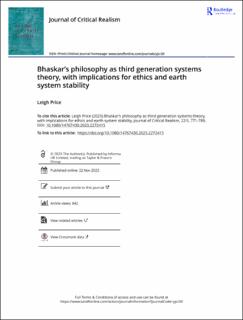Bhaskar’s philosophy as third generation systems theory, with implications for ethics and earth system stability
Peer reviewed, Journal article
Published version
Permanent lenke
https://hdl.handle.net/11250/3119217Utgivelsesdato
2023Metadata
Vis full innførselSamlinger
Sammendrag
Bhaskar’s philosophy supports society via a process of homeostasis to resist socioecological system disintegration by developing its values and ethics in response to endogenous and exogenous change. To the contrary, positivist (first generation) and hermeneuticist (second generation) approaches to systems theory have distorted humanity’s mechanism of homeostasis because, amongst other things, they disallow the use of facts to guide values/actions. Since acting on knowledge is, ceteris paribus, a given in Bhaskar’s approach, resolving socioecological system problems involves correcting the method of homeostasis (our method of finding knowledge and acting on it) rather than correcting the consequences of the failure of homeostasis (the poorly informed action or inaction). This is reminiscent of Gandhi’s approach to social transformation in which we trust the means to arrive at appropriate ends and it releases activists from having to be keepers of the moral high-ground or having to try to change people’s behaviour. Bhaskar’s philosophy as third generation systems theory, with implications for ethics and earth system stability
Utgiver
Maney PublishingTidsskrift
Journal of Critical RealismOpphavsrett
© 2023 AuthorsBeslektede innførsler
Viser innførsler beslektet ved tittel, forfatter og emneord.
-
The Power-Normal Distribution and Johnsons System bounded distribution: Computing details and programs
Mønness, Erik Neslein (Høgskolen i Hedmark - Notat;2011/3, Working paper, 2011)English: This note presents the Power-Normal (PN) distribution and the Johnson System bounded distribution (SB). PN originate from the inverse Box-Cox transformation. Formulas, estimation procedures and programs are ... -
Variabilitet og endring i utviklingen av epistemiske konstruksjoner i norsk som andrespråk: et dynamisk bruksbasert perspektiv
Horbowicz, Paulina; Nordanger, Marte; Randen, Gunhild Tveit (Peer reviewed; Journal article, 2020)I denne artikkelen utforskes utviklingen av en gruppe konstruksjoner med epistemiske betydninger i de individuelle læringsløypene til to voksne norskinnlærere i samtaledata samlet inn over en periode på ca. fire måneder i ... -
Height curves based on the bivariate Power-Normal and the bivariate Johnson’s System bounded distribution
Mønness, Erik Neslein (Rapport;04/2013, Research report, 2013)English: Often, a forest stand is modeled with a diameter distribution and a height curve as somehow separate tasks. A bivariate height and diameter distribution yield a unified model of a forest stand. The conditional ...

